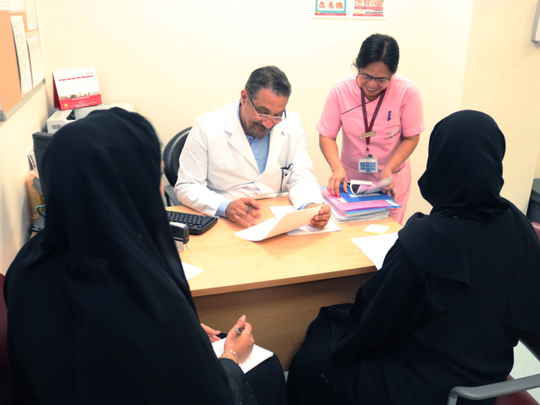
Sharjah: A Sharjah hospital has claimed that one of its surgeons has performed the UAE’s first laparoscopic surgery to correct vesicouterine fistula (VUF) on a 30-year-old mother, saving the woman from relatively greater pain that a conventional surgery would have caused.
According to a statement by the University Hospital Sharjah (UHS), its consultant obstetrician and gynaecologist, Professor Mohammad Zayed, recently conducted a laparoscopic surgery on a woman who developed VUF after delivering her fourth child.
The woman had been suffering from this condition for the past three months and as her condition deteriorated day by day, the only option left was a surgical procedure.
Vesicouterine fistula is a pathological and uncommon connection between the uterus and the bladder that allows the continuous involuntary discharge of urine into the vaginal vault. Although rare, it is usually related to caesarean section, and the incidence increases because of the increase in caesarean sections.
Across the world, correcting vesicouterine fistula is considered a complex surgical procedure that requires advanced surgical skills and experience.
“To the best of our knowledge, however, this is the first case where such a minimally invasive technical procedure has been employed to correct the condition in the UAE,” the UHS statement said.
According to a press statement issued by the UHS, the patient developed VUF after delivering her fourth child through caesarean section at another hospital in Dubai, where an undiagnosed injury led her to develop the fistula.
“Following her caesarean section, the patient noticed that she was passing urine from her vagina and not through the normal passage. As such, she did a couple of tests and was diagnosed with VUF. After a thorough medical examination, she was advised a conventional surgery to treat her condition,” a UHS official said in a statement.
While the conventional technique would work the same as the minimal invasive procedure, a laparoscopic surgery offers lesser pain, invisible scars, shorter hospital stay, less blood loss, fewer complications, including less risk of infection and faster return to normal activities.
“Correcting VUF through laparoscopic surgery is one of the most advanced procedures and requires special skills, surgical details, specific equipment and special suture material which allow for quick healing. As such, we employed the best team and techniques to perform the hour-and-a-half procedure. The recovery was smooth and uneventful with minimum hospital stay for the patient,” said Prof Zayed who performed the laparoscopic surgery.
According to him, such a surgery was performed in the UAE for the first time, though surgeons in most western countries are already doing such surgeries with good outcomes.
Fistula prevalence
The Fistula Foundation estimates that more than two million young women live with untreated fistula in sub-Saharan Africa and Asia, with 50,000 to 100,000 women worldwide affected each year. Despite being both preventable and treatable, only 60,280 women received fistula repair surgery between 2010 and 2013, according to the Global Fistula Map.












